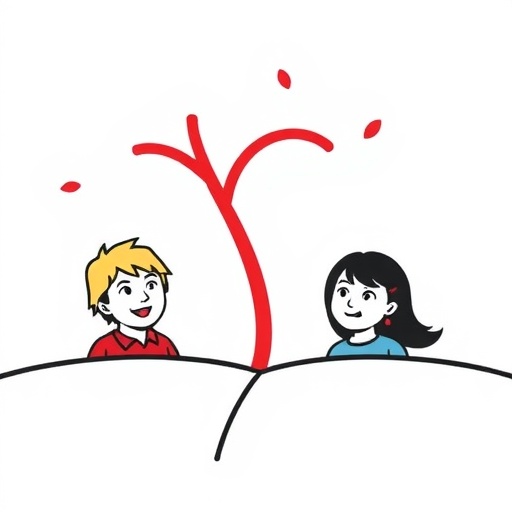In a groundbreaking study soon to be published in the Journal of Autism and Developmental Disorders, researchers explored a crucial aspect of the autism experience: the journey toward independence for autistic adolescents. This extensive survey gathered insights from both the adolescents themselves and their families. Their findings highlight the multifaceted challenges and opportunities facing individuals as they transition into adulthood, unveiling a narrative that is both unique and essential for understanding the developmental trajectory of autistic youth.
The study, led by a team of seasoned researchers including Bishop, H.J., O’Donald, M., and Sartin, E.B., delves deeply into the personal experiences of autistic adolescents. It emphasizes not only their perspectives but also the crucial role their families play in navigating this transformative period. The findings underscore the importance of understanding individual needs, aspirations, and challenges—elements that are often overlooked in broader scientific conversations about autism.
One key focus of the research examines the concept of independence itself. Autistic adolescents and their families were asked to articulate what independence means to them. Responses varied widely, reflecting the diverse ways in which individuals conceive freedom and self-sufficiency. Some participants spoke of practical skills such as managing daily tasks or social interactions, while others expressed a desire for emotional independence, emphasizing the importance of self-advocacy and confidence in navigating the world.
Navigating a world that often seems unaccommodating poses unique challenges for autistic individuals. The study highlighted that barriers to independence are often systemic and environmental. For example, accessibility in community settings, transportation options, and social support significantly influence the ability of these adolescents to engage with the world on their terms. Recommendations from participants frequently included improved training for educators and community members to better understand and support their needs.
One of the most compelling elements of the research is the emphasis on collaboration between families and professionals. Effective transition programs can thrive when they incorporate the insights of both autistic adolescents and their families. The researchers advocate for a team approach, where educators, mental health professionals, and family members work alongside adolescents to create comprehensive plans tailored to each individual’s strengths and challenges. This holistic approach not only fosters greater independence but also nurtures a sense of agency among young autistic individuals.
Interestingly, the study also noted that while many families expressed concerns about their children’s independence, they experienced positive moments of growth and success. Families shared stories of their adolescents overcoming significant obstacles, whether it was mastering a new skill, making friends, or advocating for their needs. These narratives serve as testimony to the resilience and capability of autistic youth when provided with the appropriate support and encouragement.
The importance of community engagement emerged as another critical theme in the findings. Participants hailed community support systems as essential for fostering independence. Local organizations, peer support groups, and mentorship programs were recognized as valuable resources that can help autistic adolescents build connections and acquire skills necessary for their transition to adulthood. Volunteers and mentors, who have navigated similar paths, often provide relatable guidance that can empower young individuals.
Furthermore, the research sheds light on the intersectionality of identity among autistic adolescents. Many participants identified the compounded effects of factors such as race, gender, and socioeconomic status on their experiences of independence. The study emphasizes the need for tailored strategies that recognize and address these intersecting identities in order to promote equitable support for all autistic youth.
Transformative experiences often arise from challenges and setbacks, and the research acknowledges this reality. Adolescents shared accounts of failure and frustration, illustrating the learning opportunities embedded within these moments. Families reiterated the importance of resilience, teaching their children that setbacks do not diminish their potential for future success. Supporting autonomy in the face of obstacles cultivates a foundation for confidence and self-advocacy.
The implications of this research are significant for policymakers and educators. By understanding the diverse perspectives of autistic adolescents and their families, stakeholders can create more inclusive environments that facilitate independence. Incorporating such insights into public policy and educational practices can help dismantle barriers and foster a culture of acceptance and support.
As the field of autism research evolves, it is crucial to center the voices of those who are most affected. This study exemplifies a paradigm shift toward recognizing the importance of lived experiences and perspectives. By placing autistic adolescents and their families at the forefront of discussions around independence, researchers are paving the way for more meaningful and impactful interventions.
The findings of this research also encourage ongoing dialogue among families, educators, and healthcare professionals. Regular conversations about the varying definitions and avenues toward independence can lead to more effective strategies and supports. By working collaboratively, communities can ensure that autistic adolescents have access to the resources and guidance necessary for a successful transition into adulthood.
In conclusion, the research by Bishop, O’Donald, Sartin, and others provides a rich tapestry of insights into the complex journey toward independence for autistic adolescents. It resonates much beyond academia, inviting society at large to reflect on the definitions, supports, and policies surrounding autonomy. By prioritizing the perspectives of autistic youth and their families, we collectively move closer to creating a world that values and empowers every individual, irrespective of their neurological makeup.
Subject of Research: Perspectives on independence from autistic adolescents and their families.
Article Title: Driving Toward Independence: Perspectives From Autistic Adolescents and Their Families.
Article References:
Bishop, H.J., O’Donald, M., Sartin, E.B. et al. Driving Toward Independence: Perspectives From Autistic Adolescents and Their Families.
J Autism Dev Disord (2025). https://doi.org/10.1007/s10803-025-07097-z
Image Credits: AI Generated
DOI:
Keywords: Autistic adolescents, independence, family perspectives, transition to adulthood, support systems, community engagement.
Tags: autistic adolescents independence journeychallenges of transitioning to adulthooddevelopmental trajectory of autistic adolescentsdiverse definitions of independencefamilies of autistic teens supportimportance of family in autism transitionJournal of Autism and Developmental Disorders studynavigating independence for autistic individualspersonal experiences of autistic youthperspectives on independence in autismresearch on autism and independenceskills for self-sufficiency in autism





